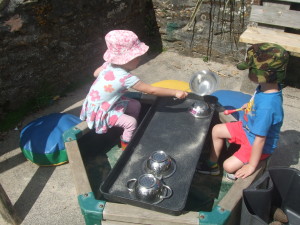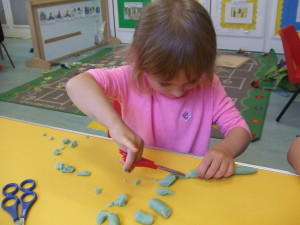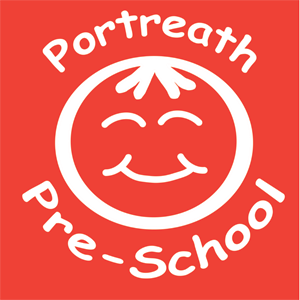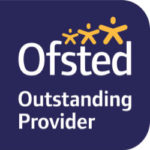Play & Learning
 At Portreath Pre-school we will support your child in developing the skills, knowledge and understanding that will help them to make sense of the world and ensure they are ready for the next step in their development and learning. This is achieved through the wide range of play and learning experiences on offer in and out of the playroom, and through the interactions between the staff and children.
At Portreath Pre-school we will support your child in developing the skills, knowledge and understanding that will help them to make sense of the world and ensure they are ready for the next step in their development and learning. This is achieved through the wide range of play and learning experiences on offer in and out of the playroom, and through the interactions between the staff and children.
Each member of staff has a group of children for whom they are particularly responsible for. Your child’s key person will be the person who works with you to make sure that what we provide is right for your child’s particular needs and interests.
When your child arrives at the pre-school the key person will help your child to settle, become familiar with the routine and environment of pre-school and encourage them to take part in activities and play and learning experiences. The key person will closely observe your child at play, and how they engage with others and the resources available, to work out how they can best support them to take the next step in their learning and development.
Before your child starts at our setting the key person will make a home visit. During this visit the views of you, the parent, and your child are discussed. These views help us settle your child into pre-school and ensure a good transition from home to pre-school is made. Home visits are a great way for your child to begin to build their relationship with their key person in the familiar space of their home.
Your child’s key person will document your child’s learning journey whilst they are with us in their Learning Journal, in the form of photos, observations and comments from your child. The journal is very much your child’s book and they are actively encouraged to add to, reflect on and share what is inside it. In this way they extend and reflect on their learning and achievements which also promotes their self confidence. We actively encourage parents to add to it with photos and observations of what they notice about their child. The journals are out in the playroom, everyday, for children to access and they are also regularly sent home.
Purpose and aims of the Early Years Foundation Stage (EYFS)
 Every child deserves the best possible start in life and support to fulfil their potential. A secure, safe and happy childhood is important in its’ own right, and it provides the foundation for children to make the most of their abilities and talents as they grow up. When parents choose to use early years services they want to know that provision will keep their children safe and help them to thrive.
Every child deserves the best possible start in life and support to fulfil their potential. A secure, safe and happy childhood is important in its’ own right, and it provides the foundation for children to make the most of their abilities and talents as they grow up. When parents choose to use early years services they want to know that provision will keep their children safe and help them to thrive.
The Early Years Foundation Stage Framework (EYFS 2021) is a document which lists specific requirements related to Welfare, Learning and Development and Assessment. Ofsted has the role of evaluating the work of Early Years settings and ensuring that the requirements of the framework are met.
The overarching aim of the EYFS is to ensure that early years settings support the development of young children through ensuring that each child is viewed as unique and that positive relationships and an enabling environment (with teaching and support from adults) support their learning and development. These will help young children achieve the five Every Child Matters outcomes of staying safe, being healthy, enjoying and achieving, making a positive contribution, and achieving economic well-being.
The 2021 Early Years Framework lays out the areas of development that we must nurture, support children to develop in and assess. The Prime Areas are fundamental to learning and essential in the development of a child. The following areas will form the main focus of our curriculum and planning:
Communication and Language;
- Listening, Attention and Understanding
- Speaking
Personal Social and Emotional Development;
- Self-Regulation
- Managing Self
- Building Relationships
Physical Development;
- Gross Motor Skills
- Fine Motor Skills
Our curriculum also covers the specific areas of ;
- Literacy (Reading, Writing-age appropriate activities)
- Mathematics (Numbers, Shape, Space and Measure, Patterns)
- Understanding the World (People, Culture and Communities, The Natural World, Past and Present)
- Expressive Arts and Design (Creating with Materials, Being Imaginative and Expressive)
Running through all of these areas are the ‘Characteristics of Effective Teaching and Learning’. These underpin everything we do and are crucial skills for children to become successful, independent problem solvers and learners. These are:
- Playing and Exploring – which involves ENGAGEMENT – children investigate and experience things, and ‘have a go’.
- Active Learning – which involves MOTIVATION – children concentrate and keep on trying if they encounter difficulties, and enjoy achievements.
- Creating and Thinking Critically – which involves THINKING – children have and develop their own ideas, make links between ideas, and develop strategies for doing things.
The Government have published a document for parents/carers called ‘What to expect, when?’. This has been published to help parents find out more about how their child is learning and developing during their first five years in relation to the Early Years Foundation Stage (EYFS). The EYFS outlines what the pre-school needs to do to support your child. The document can be downloaded at 4Children_ParentsGuide what to except when. It is an interesting and useful document which has lots of ideas for how to support your child’s learning and development.


